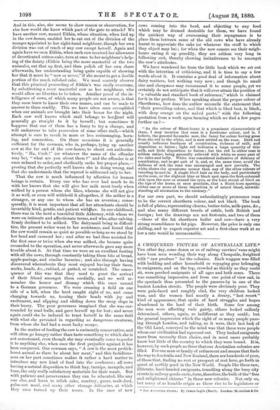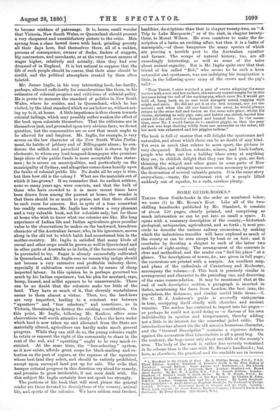A CHEQUERED PICTURE OF AUSTRALIAN LIFE.* THE other day, some
dozen or so of railway carriers' vans might have been seen wending their way along Cheapside, freighted with "raw produce" for the colonies. Each waggon was filled with bedding and other household or voyaging gear belonging to emigrants, and on the top, crowded as thickly as they could sit, were perched emigrants of all ages and both sexes. There was something impressive, and from one point of view sad, in the spectacle thus presented to the passers-by in one of the busiest London streets. The people were obviously poor. They were pale-faced and roughly clad, the very children looked wan, and the women had mostly a dreary, "last resort" kind of appearance, that spoke of hard struggles and hopes abandoned in the land of their birth. Some few among the men were affecting rude gaiety, others looked sullenly determined, others, again, as indifferent as they could ; but the general impression which the sight of so many people pass- ing through London, and taking, as it were, their last look of the Old Land, conveyed to the mind was that these were people whom our civilisation had squeezed out. They looked emigrants more from necessity than choice, and in most cases probably knew but little of the country to which they were bound. It is, however, by such people as these that our Australian colonies are filled. For one man or family of refinement and means that finds the way to Australia and New Zealand, there are hundreds of poor, of those that, finding no rest or prospect of rest here, go forth in quest of earthly good in the New World. People like these raw, illiterate, hard-handed emigrants, trundling along the busy city streets in railway goods-carts, form, th erefore, the bulk of the "free and enlightened citizens" in these new colonies. Not only so, but many of as humble origin as these rise to be legislators or • Our Australian Cotten:. By James Inglis (Maori). Loudon: Mcmfll&fl & Co to become wielders of patronage. It is, hence, small wonder that Victoria, New South Wales, or Queensland should present a very chequered and unsatiffactory picture to the critic. Men sprang from a class bowed down with hard, grinding poverty all their days here, find themselves there, all of a sudden, persona of consequence, owners' of flocks, finders of nuggets, big contractors, and merchants, of at the very lowest earners of *ages higher, relatively and • actumlly, than they had ever dreamed of in England. It is but natural to suppose that the life of such people should be coarse, that their aims should be sordid, and the political atmosphere created by them often tainted.
Mr. James Inglis, in his very interesting book, has hardly, perhaps, allowed sufficiently for considerations like these, in his estimates of colonial progress and criticisms of colonial policy. He is prone to measure the standard of politics in New South Wales, where he resides, and in Queensland, which he has visited, by the ideal standard which we set before us, without act- ing up to it, at home. A little impatience is thus shown towards colonial failings, which may possibly rather weaken the effect of the book upon colonists themselves. That the criticisms are in themselves just, and grounded upon very obvious facts, we do not question, but the communities are so new that much ought to be allowed for and forgiven. Mr. Inglis, for example, is very severe on the low character of the New South Wales Parlia- ment, its habits of jobbery and of Billingsgate abuse; he con- demns the selfish and parochial spirit that is shown by the electorate, to whom any loud-tongued demagogue who promises large slices of the public funds is more acceptable than states- men ; he is severe on municipalities, and, particularly on the municipality of Sydney, and altogether comes down heavily upon the faults of colonial public life. No doubt all he says is true, but then how old is the colony ? What are the materials out of which it has grown? If we remember that its earliest settlers, none so many years ago, were convicts, and that the bulk of those who have crowded to it in more recent times have been drawn from among the poorest at home, the wonder is that there should be so mach to praise, not that there should be such room for censure. But in spite of a tone somewhat too readily censorious, Mr. Inglis has written a very pleasant and a very valuable book, not for colonists only, but for those at home who wish to know what our colonies are like. His long experience of Indian life and Indian agriculture gives peculiar value to the observations he makes on the backward, humdrum character of the Australian farmer, who, in his ignorance, moves along in the old rut to which habit had accustomed him in the mother-country. Mr. Inglis is satisfied that many kinds of cereal and other crops could be grown as well in Queensland and in other parts of Australia as in India, if the farmers could only be persuaded to try. Sugar is already successfully cultivated in Queensland, and Mr. Inglis sees no reason why indigo should not become a very extensive and profitable industry there, especially if cultivation were carried on by means of cheap imported labour. In this opinion he is perhaps governed too much by his Indian experience; but his plea for mustard, rape, hemp, linseed, and millet appears to be unanswerable. There can be no doubt that the colonists make too little of the land. They have so much of it, that slovenly wastefulness seems to them almost a virtue. Then, too, the land-laws are very imperfect, leading to a constant war between " squatters " and "free selectors," and sometimes, as in Victoria, threatening to destroy the existing constitution. On this point, Mr Inglis, following Mr. Runken, offers some observations well worth attentive study. Unless the laws under which land is now taken up and alienated from the State are materially altered, agriculture can hardly make much. general progress. While they can still do so, the young colonies ought to retain or reassert the right of the community to share in the rent of the soil, and " squatting " ought to be very much re- stricted. At the same time, the " free-selecting " system, as it now exists, affords great scope for black-mailing and ex- tortion on the part of rogues, at the expense of the squatters whose best land they select, and should be entirely prohibited, except upon surveyed land put up for sale. The evils that hamper colonial progress in this direction cry aloud for remedy, and promise to grow intolerable, if not soon dealt with. On this subject Mr. Inglis certainly does not speak too strongly.
The portions of his book that will most please the general reader are those devoted to descriptions of the scenery, animal life, and sports of the colonies. We have seldom read fresher,
healthier, descriptions than that in chapter twenty-two, on "A
Trip to Lake Macquarie ;" or of the visit, in chapter twenty- three, to Mount Wilson. He even contrives to make the de- • scription of a battu an exciting affair, but then it is a battu of marsupials,—of those kangaroos the many species of which are proving a terrible pest to the Australian squatter and farmer. The scraps of natural history, too, are all exceedingly interesting, as well as some of the tales about animal sagacity. But is Mr. Inglis quite sure that that friend of his called "Bob," who seems to be such a keen naturalist and sportsman, was not indulging his imagination a little, in the following queer story of the crows and the pig's tail ?—
" Near Tamut, I once watched a pair of crows adopting the same tactics with a sow and her suckers, the savoury morsel sought for in this instance being the tail of the sucking-pig, which crow No.2 would get hold of, hang back on to and twist savagely round, tugging with might and main. Ile did not get it at the first attempt, nor yet the second ; and when the old sow hunted him away, he would always return to the same tail and fasten on the same sore place, whilst his victim, shrieking as only pigs, cats, and babies can shriek, hauled him round till the old mother charged and hunted him. In the mean- time, crow No. 1 would fasten on to another piggie, so that the poor old sow was kept dashing wildly from one marauder to the other, till her neck was exhausted and her piggies tailless."
The book is full of matter that will delight the sportsman and naturalist, and about which there can be no doubt of any kind.
Yet even in much that relates to mere sport, the picture is very chequered. Reckless colonists, miners, and bush-loafers, people who when out for a holiday blaze away at anything ' they see, in childish delight that they can fire a gun, are fast thinning the winged and other game in some parts of New South Wales, and stringent measures seem necessary to prevent the destruction of several valuable genera. It is the same story everywhere,—waste, the exuberant riot of a people lifted. suddenly out of squalor, to a rude, careless plenty.































 Previous page
Previous page